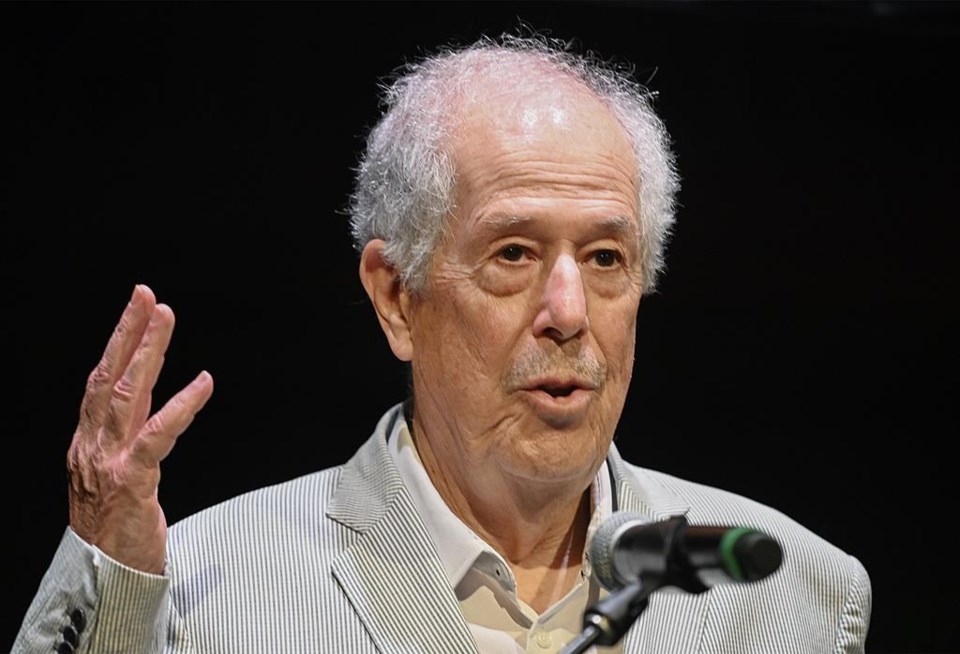Veteran filmmaker Denys Arcand is having a change of heart.
“My energy comes from the public, which is absolutely wonderful,” the 82-year-old Québécois director says in a video call from Montreal.
His latest film, “Testament,” expands theatrically in Canada on Friday after proving a hit in Quebec.
“It makes me softer and more at ease with mankind.”
The public is giving Arcand lots of energy, as “Testament” earned an impressive $400,000 during its opening weekend in Quebec last month and has already crossed the $1.5 million mark. It’s the strongest opening for a Quebecois film since the pandemic began.
“Testament” marks another satire from Arcand after 1986’s “The Decline of the American Empire” and 2003’s “The Barbarian Invasions,” which represents Canada’s only Oscar win in the best international film category.
Arcand’s latest film roasts political correctness as septuagenarian archivist Jean-Michel, played by Rémy Girard, sees a group of protesters rally outside his retirement home. As the mob advocates for the removal of a mural that depicts Samuel de Champlain’s first contact with Indigenous people, Jean-Michel finds love with the home’s director, played by Suzanne Francoeur, as their struggle to understand the world unites them.
Arcand explains he was inspired by a controversy with a similar painting at the Museum of Natural History in New York City. He says that curators remedied the situation by placing commercial glass atop the mural and annotating its inaccuracies.
“I went to New York and saw it. I started thinking that, eventually, we could correct all western art like this,” says Arcand. “There's always something that you can do better, or correct, or offer a different point of view.”
The director adds the event left him perplexed about the state of culture.
“As we change, of course things are different in our point of view,” says Arcand.
“But do you go back and correct the whole past? Do you behead every statue in every park of the western world? Do we change art? These are the questions that I thought were interesting.”
Arcand hasn’t shied away from these questions, either. He playfully dropped an F-bomb on the talk show “Tout le monde en parle” recently when asked if he made cultural consultations during scripting. He was asked specifically if he consulted his transgender son Carter, who appears in the film, regarding jokes about pronouns.
Arcand reiterates that consultations are for government services, but not for satire.
“A work of art is something extraordinarily personal. It's something that comes from the deepest part of you. I don't feel that consulting would lead to anything,” Arcand notes.
“Rembrandt didn't consult people to paint the ‘The Night Watch.’ To me, it's abhorrent. Consulting is something that you do and it's absolutely valid. But it's in another field of society, not in art.”
Consultations for “Testament” would have proved exhaustive, too. Arcand lampoons people of all stripes: feminists, cyclists, vegans, Quebec nationalists and everyone in between land in the crosshairs.
“I have friends who are cyclists and they always want to put me to shame,” laughs Arcand. “I want to talk about everything that bugs me in life.”
The film’s sense of humour comes in part through Girard’s performance as a man from a bygone era.
“Testament” marks Girard’s fifth film with Arcand and the actor shows a natural rhythm for the filmmaker’s literary dialogue.
“He shows up and he reads the line just one time. Then he says it, and it's exactly how I imagine it had to be said when I wrote it,” says Arcand.
“He has this amazing knack for understanding perfectly how I write and how I want it to sound.”
The casting of “Testament” adds an inside joke to Arcand’s satire. Filmmaker/dramatist Robert Lepage, whose controversial plays “SLĀV” and “Kanata” were both cancelled in 2018 amid charges of cultural appropriation, appears as the assistant minister of culture.
“It was a very, very difficult experience for him, so I thought it would be fun that he could have his revenge,” Arcand laughs.
“Testament” sees Lepage’s character defend artistic expression, ridiculing Cirque de Soleil and Céline Dion as barometers for Quebec culture while praising the controversial mural.
Arcand, however, says that he hasn’t heard if Dion has seen the film.
“I've met her a few times and I think she has a sense of humour, so she would go along with it, I guess,” he laughs.
Arcand hopes that audiences share a laugh with “Testament” and understand that the tough love he delivers is not that of a cynic, but an optimist.
“A cynic is hopeless. He thinks that things are going to turn from bad to worse, and he has absolutely no hope. Satire is something that you do hoping to change the way people behave,” says Arcand.
“That's been my motto forever: you underline stuff that you think should be changed. But at the same time, you make it in a light, entertaining way hoping that people are going to be better. There's hope. It's not despair.”
“Testament” opens Friday in cities including Victoria, Vancouver, Edmonton, Calgary, Winnipeg, Toronto, Ottawa and Halifax.
— Pat Mullen is a freelance writer based in Toronto.
This report by The Canadian Press was first published Nov. 9, 2023.
By Pat Mullen, The Canadian Press



